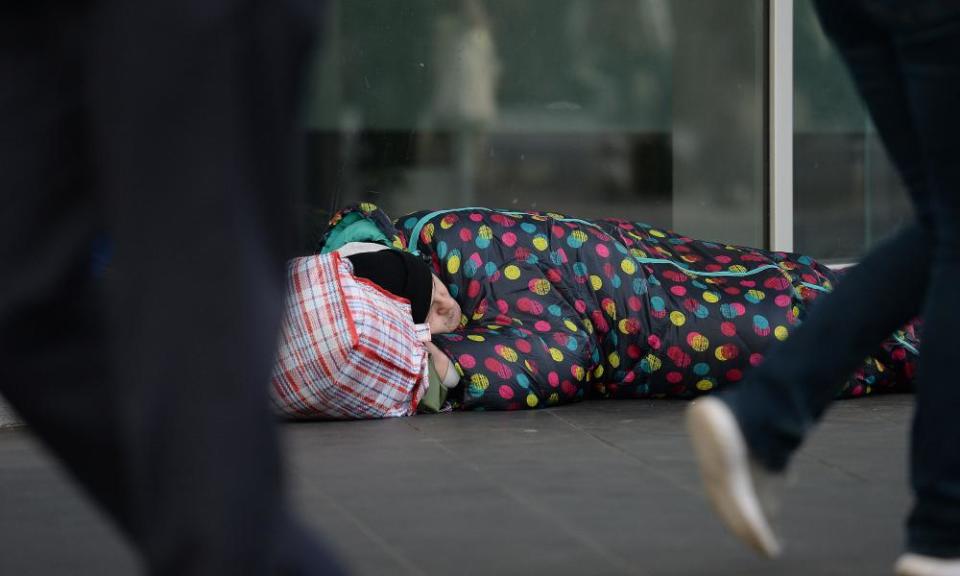The Guardian view on homelessness: don’t cast everyone out again

Putting people in hotels during the pandemic made a difference. But far too many remain chronically insecure
When the elements turn hostile, we are more than ever dependent on the roofs over our heads. So evocative is this scenario, of humans walled up against the cold, that there is talk of a film capturing the experience of the group snowed in for three days at a Yorkshire pub during Storm Arwen. But for those without a safe place to shelter, extreme weather is an ordeal to be endured. Last week, the Liverpool Echo reported on complaints about a local McDonald’s that refused to sell hot food to a woman who wanted it for a homeless man she met outside in pouring rain.
Starting in March last year, the Everyone In scheme saw 37,000 rough sleepers offered emergency accommodation, much of it in hotels. But since the initial instruction to councils to take people off the streets, the guidance has been diluted. The already acutely vulnerable group who lack recourse to public funds, due to their immigration status, is set to grow as a result of the government’s borders bill. And there is disagreement about the figures, with the number seeking support last year far greater than would have been indicated by council rough sleeping figures.
What is beyond dispute is that those sleeping rough on any given night (most do not consistently sleep outdoors) are the tip of a much larger iceberg. The problem of homelessness extends beyond rough sleepers, most of whom are men, and many of whom have mental health problems (in London, the most recent survey found rough sleepers to be 82% male and 10% aged 25 or under). Around 330,000 households received support from councils in England, Wales and Scotland in 2019-20 on the grounds that they lacked housing. Many of these families are trapped in unsuitable temporary accommodation such as bed and breakfasts. Cuts to universal credit and other benefits, and the disastrous failure to regulate the private rental sector properly, exacerbate the kinds of chronic insecurity that can lead to rough sleeping; for example, if a family breaks down.
While it is often assumed that people seen on the streets have nowhere to sleep, in some cases it is during the day that people have nowhere to go – before shelters open in the evenings. Meanwhile, the so-called hidden homeless get by through sofa-surfing or joining already crowded households. In London, Manchester and elsewhere, some good work was done by councils and charities, which took rough sleepers into hotels during the pandemic, enabling some to move on to more secure situations. But with the eviction ban rescinded, and a backlog of arrears, there is a real risk that the ranks of the housing insecure will quickly swell.
An underlying problem is the government’s commitment to rising property prices, which serves the interests of homeowners, developers and speculators, but works against people who don’t own their homes and can’t access secure and affordable rented ones. New research from the Resolution Foundation shows that the proportion of 25- to 34-year-olds who are homeowners has fallen from 51% in 1989 to 28% in 2019. One charity, Centrepoint, has predicted that the rate of homelessness among under-25s in England could soon reach a record high.
Cuts over the past decade to the local services relied on by rough sleepers, and others in the most vulnerable categories, have made it harder to access support. The approach taken during the pandemic was a marked improvement. The number of recorded deaths of homeless people in England and Wales, for example, fell from 778 in 2019 to 688 in 2020 (though experts warned that this could be an underestimate). But the people at the sharp, sometimes brutal end of Britain’s housing crisis need more than a temporary bed – and some redistribution of the benefits accrued from rising property values must be part of any meaningful “levelling up”. In the meantime, and during the winter, the voluntary sector has a strong record in supporting homeless people and needs public support.

 Yahoo Finance
Yahoo Finance 